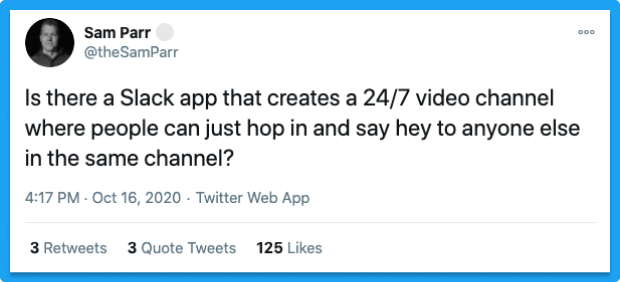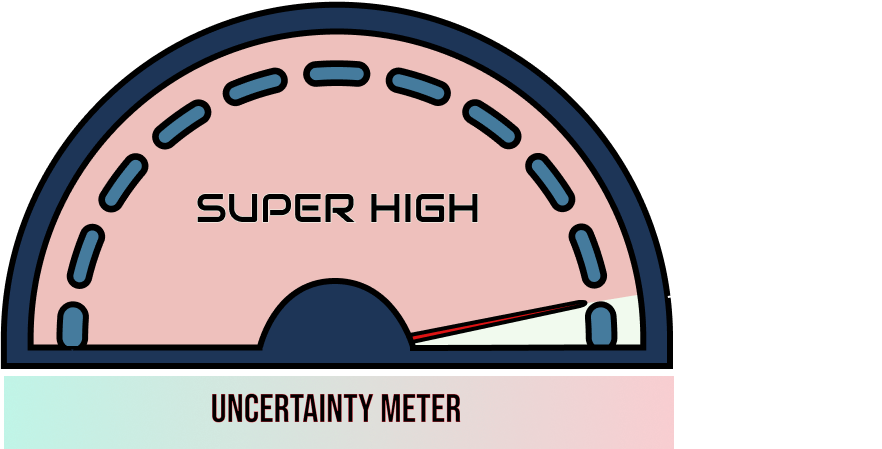After 4 brain surgeries, I left my 6-figure tech job. Now I’m launching a startup in public.
First, a bit about me:
I’m 30 years old. I’ve founded a startup backed by YCombinator and, more recently, worked as a Senior Product Manager at a tech company in San Francisco.
Last December and January I went on medical leave for a series of brain surgeries. After a longer-than-expected recovery, I wasn’t unable to return.
Now I’m almost 100% and am scratching the itch to start something new - this time as a solo, bootstrapped indie hacker.
The idea
I stumbled upon this tweet from Sam Parr, founder of The Hustle, a couple weeks ago.

It got me thinking:
How do remote workers distributed globally develop personal connections with coworkers?
I’ve always had great personal relationships at work. It’s made work more fun and productive. So this is a problem I feel excited about solving.
I'll be publicly sharing all the details week by week.
Why?
For me: As a solo founder, I need a source of accountability and feedback.
For you: My mission is to increase the startup success rate for Indie Hackers.
I believe this can be done with the right process, a process I'll (hopefully) be figuring out live in a weekly newsletter called The MVP Sprint.

You can read more about my goals and inspiration for the sprint here. Subscribe if you'd like to follow along!
The inspiration comes from GV’s Design Sprint - a five-day process for solving problems and testing new ideas. I’d highly recommend reading The Sprint Book if you’re not familiar with it.
We all make decisions with tons of uncertainty
My goal with an MVP Sprint is to reduce as much uncertainty as possible as quickly as possible.
Right now, my uncertainty level is off the charts:

Week by week, I’ll be reducing uncertainty, starting with my first 3 steps:
-
Choose a problem - I dive into how I spot problems and more about how I chose this one in my first article.
-
Think about my primary user - Is it all remote companies? Only remote companies distributed across x time zones? Only remote companies within a specific vertical?
-
Validate a (user, problem) pair - Outside of basic needs like hunger and shelter, most problems are only problems in the context of specific users. I’ll validate the problem with research and customer discovery.
I don't expect the first idea to be a massive success
But I do expect to fail fast, learn from my failures, and get back up on the keyboard.






Support!
I had a little bit of experience looking into this topic before, spoke to many HR directors to learn more, I hope my sharing here would help:
People on a remote team are generally more independent, so even if a leader says "hey guys, you guys should meet up for 1on1 chat." It is hard to know whether it happens. So some teams use tools like https://www.donut.com/ to automate it and easily track
Teams play a lot of games online together to create bonding. Games bring people together and also take people's mind off "work". However, I found that they like to switch to new games to keep it fresh, it is hard to have one game that they will keep going back to. And finding games = a job of that HR/team experience person.
It is hard to just find a game and then play it. Most people learn about different "games" the team can play, then customize it to fit the objective they want. E.g. they want to talk about fitness/wellness this time, so the activity is all about that. Next time could be family. Next could be mental health.
In company <50 pax, found that a lot of times the co-founders/CEO would be the person looking themselves. For bigger companies, usually a designated person.
Sidenote: there are quite a lot of "virtual office" software where colleagues can move around and catch up with each other, personally find that a little weird but not sure if teams are enjoying this type of set up
Hope this helps so far.. let me know if you have other questions, try my best to help!
Thanks so much for the response! This is super helpful.
Right now I'm focusing more on an asynchronous tool. Most of the apps out there seem like they only really work when everyone's online at the same time.
My very early product vision for an MVP is a slack bot that messages teammates individually with some sort of prompt. The prompt could be "Show us a picture of your dog!", "What did you do last weekend?" or "What's a fun fact about your city?".
Users can respond with images, videos, and messages. Then responses are stitched together into a shareable page or video and shared with the entire team.
I def like that you're going for async because to me, async scales.
I worked with icebreaker questions too and realized there are 2 types of questions: 1 is more casual, fun-oriented, 1 is more deep and really get to learn about the other person. I learned that it is best to alternate so people get the fun + have more meaningful connection (through learning more about each other -> helps teamwork).
Look forward to your MVP! :)
You really know this domain! I took screenshots of both of your comments into my running product notes :)
Great insights on icebreaker questions. I've gotten some similar feedback about alternating; they emphasized that it's also about "icebreaker fatigue" - too many deep questions, especially over video, might lead people to stop participating.
Haha happy I can help!
Yes I agree, and also when they don't feel like those questions lead to some sort of bonding/understanding/rewards, the "motion" to answer becomes harder and harder.
Another tough question for you to answer "Why would someone be reading others' responses? What's the value there for them?" Usually team leaders want the team to bond, but the team members don't have the "urge".
That's a really good thought. That'll be pretty crucial to the feedback loop to get people to keep using it after trying it for the first time.
I could certainly come up with some hypothetical responses here, but the product will be the real test :)
Love the premise and your story. It's often life changing experiences like you've had that change your attitude. Great work, keep it up!
Thanks Josh! Tons of comments like yours really do wonders for the self-confidence and motivation.
Does 'fail fast' really work? The success rate of startups is still very low despite the adoption of the 'fail fast' methodology. It seems to me that most of the 'fail fast' champions are more successful with producing newsletters and online courses than with building a startup. It seems to me that the most successful products we see on IndieHackers are the result of a long term project... Of course, some of us get lucky but how often does it happen?
'Fail fast' makes entrepreneurship more accessible to the masses: when the going gets tough, no need for more creativity and grit, we simply move on to the next project.
Is 'fail fast' overrated?
'Fail fast' assumes that in case of failure the main cause is the concept, when there is a much higher probability that the main cause of failure is the implementation. One has to explore a vast realm of implementations to assert that a good concept is doomed.
Now, there are really bad concepts, but that should become obvious before the implementation stage.
fail fast could be translated to validating the ideas product-market fit with a minimum viable product.
I think it does! I would guess that most of the "overnight" success stories we all see on IH are the result of founders applying it well, either with the current project or previous ones.
I think the cause of failure could be a few different things:
There are more but that's just a start.
It could very well be the case that while the successful products we see didn't fail entirely, but failed with some of their initial core assumptions along the way (but evolved). By failing fast and iterating, they rapidly increase their rate of learning to eventually get to what works.
We are talking about failing fast with various assumptions to find the best way forward for a project; that makes sense to me.
Cool. this is awesome.
Thanks Sam!
Enjoyed the writing style. Subscribed!
That's great! Glad to have you as a subscriber :)
Interesting, I'll follow along :)
Good idea felix! i'll follow along too!
Awesome, thanks Felix!
Exciting project, Tim. Looking forward to see how it goes!
Thanks a lot, Joao!!
Love the idea, I work on a team that crosses a few time zones. USA East Coast to Western Russia.
It's a challenge to force interaction and honestly I think when you force interaction it is best to start with non-work subjects or some sort of "sticky" item.
I do love the idea of having some sort of weekly ranking or "standings" for something OTHER than fantasy football, haha.
A few of the devs play chess.com together it'd be cool to have quick games with others!
That's neat - I've heard of lots of teams finding different online games to play with each other.
How does your team coordinate overlapping work hours across those time zones?
Well, a few different things! But, I don't think we have it completely figured out!
We have a set of weekly meetings (tech design, grooming user stories for development, retro) that we group together on one day. We'll set the times to make sure the hours will work for all team members.
The whole team is aware of the limitations of cross-zone communication, ie. prefer async communication to synchronous communication.
I do think our team in Russia sacrifices a bit more than us in NY! They'll conform more to our US east coast hours than we do for them.
But, we'll try and limit this by grouping a lot of our meetings so that it only happens once a week.
I'm sure we could do better by adding time blocks on our shared google calendar to make the time zone restrictions more accessible to everyone.
I like the idea of clustering them all in one day. That way it only everyone can have 4 super productive no-meeting days to get deep work done.
That's great you embrace async communication. Do you use Teams, Slack, or another intracompany messaging app?
We use Slack, Clubhouse, Zoom (Slack video isn't always great!)
Agreed on Slack video! That's great. I'll follow up with you when I've made some more progress to see if you think it could be a good fit to beta test :)
Thanks so much for all the feedback. You've been super helpful!
This comment was deleted 4 years ago.
Hey Tim, thanks for the great write-up. The tweet made me think of discord which I believe has that exact functionality. They have "voice channels" which users can click and enter, and leave just as quickly. No one has to "start" it, it is always there as an option. You can also view the current users in the channel. I'm curious to see how you think of applying this to slack!
I'm familiar with Discord, but have never personally used it. This is great to know. I'll put it on my list to play around it with it before I get into spec'ing out what I'll be building. Thanks for sharing!
Although not a Slack app, I created a website to cater for this kind of problem. Inoffice.
Anyways I wish you all the best !
That's neat! I think there's a lot of potential with the "virtual office" concept. There are a few players trying to do it, but it's all so new.
Thank you, and good luck to you too!
I can't imagine how scary the brain surgeries must have been. I've recently been dealing with post concussion syndrome and it can be a real challenge. So happy that you are back to 100%
Sorry to hear about that :/ Hope it improves. Yea they were, but luckily I had great family support and a great medical team.
Btw, just followed you; Roamer looks great! Hopefully I'll be able to travel next year with COVID and try it out. Curious how you pull together the data for it!